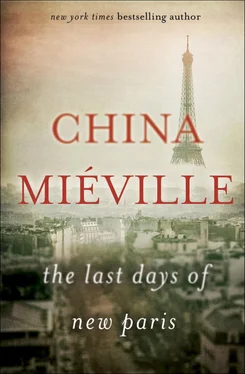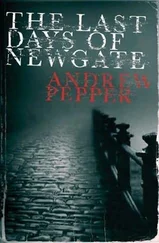I’m leader of the Agape Lodge. Anointed by the great wizard himself, the young scientist was Crowley’s chosen. I’m an apostle of freedom. Like these guys. Here to help my friend.
Jack Parsons was attuned to the unholy. He could tell there was magic from Hell in the ground of France, that someone was raising. He was certain that it could help him.
So he checked his tools and dressed for dinner. When he entered the dining room, everyone turned to look, and he hesitated.
Come on, he told himself. You’re here for a reason.
—
Painters, poets, anarchists, Reds. A poised blond woman gave Parsons her hand and introduced herself as Jacqueline Lamba. Jack nodded as politely as he could and followed her to meet her husband.
André Breton. A fleshy-faced man with sweeping hair. He looked at the young American with half-closed eyes of almost languid intensity. Parsons met the stare with his own. “I wanted to ask you something,” Parsons began. “About Ithell Colquhoun.”
“Je ne parle pas anglais.” Breton shrugged, and walked away.
Jack frowned and took a glass of wine. A slight dark-skinned man introduced himself. “Wilfredo, Wilfredo Lam.” Remedios Varo, a painter, black-haired, with an intense gaze, nodded at Jack without much interest. A cool, tall woman, Kay Sage, inclined her head. Jack said hello to them all and kept watching Breton, who would not talk to him. A vivid-eyed man called Tanguy laughed too loud. These Surrealists wore battered evening clothes.
“Jack Parsons,” Fry said to a small smiling gentleman, Benjamin Péret, who greeted Jack with a lopsided mouth, while Mary Jayne and Miriam watched. “He’s stranded among the Nazis.”
“The Nazis? You know of Trotsky?” said Péret.
“I guess.”
“He says these fascists are dust that is human.” Péret nodded vigorously. “He is right.”
“What would they think of you, Parsons?” someone said.
They sat to heavy vegetable stew seasoned only with salt. Parsons breathed deep and drew strength from the hex-fouled land outside. Do they even know? he thought. That something’s happened?
He sat in the Villa Air-Bel with the artists and radicals, writers, the philosophers that bleeding-heart Americans wanted to smuggle out of France. What am I doing here? He looked at his food in despair.
“Foreigners need to carry seven pieces of paper all the time,” Mary Jayne Gold was saying. Why was she looking at him like that? Had he invited this information? Jack had lost track.
“You don’t say,” said Jack. “That’s crazy.”
“Varian says you’re a scientist.”
“Yeah. I work with…” He made his hand zoom through the air. “Rockets.” I make bombs fly with fucking Greek fire. And you will thank me.
“Do you know our guests made a pack of cards?” Miriam said.
“I did not know that.”
“Yes,” said Lamba. She laughed. “We will play with you.”
—
Trapped in their Marseille hinterland, this pre-exile, the Surrealists had drawn new suits, a cartographic rebellion. Black Stars for dreams; black Locks, Keyholes, for knowledge; red Flames for desire; and Wheels for revolution. They had enshrined beloveds as face-cards: de Sade, Alice, Baudelaire, Hegel, Lautréamont.
“There’s talk of having them printed, eventually,” Fry said with an effort.
“Play is resistance,” said Lamba, with her heavy accent.
That’s how you rebel? Parsons realized his disgust must show. In a town full of Gestapo, informers, fascists, fighters. That’s it?
Breton was looking at him at last, in challenge.
“I saw two boys in town,” Miriam was saying to someone. “They each had two fishing rods, crossed over their backs. Do you get it? Deux Gaulles —it’s a pun, de Gaulle. They’re stating their opposition.”
Get me out of here, Parsons thought.
“What is it exactly brings you here, Mr. Parsons?” Mary Jayne was brittle. “This is a very odd time to travel.”
—
Parsons could not keep track of the visitors, though their names and expertise and philosophical positions were all announced to him in what felt like mockery.
When, late, a thin, tough-faced young man came in, Mary Jayne shouted with pleasure and went to him. Miriam glowered and made to rise, but Varian Fry, though he frowned at the newcomer, put his hand on hers to hold her back.
Raymond Couraud, his arm in Mary Jayne’s, stared slowly around the room. Breton pursed his lips and looked away.
“I did tell André that you were asking about Ithell Colquhoun,” Parsons heard Fry say. The name got his attention. Breton was nodding at him with a moment’s interest. He spoke and Fry translated. “She did come to visit him a while ago. That’s why he put her work in that little volume.”
That was all. These people are nothing, Parsons thought. Nothing.
—
“It’s bad for us,” Von Karman had said to him, of his family, of the Jews of Europe. “My great-great-however-many-times-great grandfather,” he had said, “was Rabbi Loew. You know Rabbi Loew, Jack? From Prague. He made a giant clay man and figured out how to bring him to life to keep the Jews safe. You know what that made him? The first applied mathematician.”
Von Karman liked that joke. He repeated it often. It pleased Jack, too, but for different reasons. Von Karman was right: to make life was to speak aleph where there was silence, to add one to a zero. Jack read everything he could find on Loew, the efforts and triumphs of that devout man.
Between the trajectories of rocket falls, rainbow-shapes and gravity, between his imaginings of the screamings across the sky that he would send the Nazis, Parsons, with exhausting care and thoroughness, developed an arithmetic of invocation, an algebra of ritual. A witching plan.
I’ll go to Prague, he decided at last. He checked his proofs. I’m an engineer: I’ll make an engine. I’ll do the math in the grounds of the ghetto. I’ll bring back this golem.
He could do it. He looked forward to its swinging steps, its thick clay hands cleaving storm troopers, its purging of the city. That would shake up this war. Screw it, he thought. I’ll do it for Theo.
And now here he was trapped in France by war and devil-science. In the room Fry had lent him, before descending, Jack Parsons had unwound the jury-rigged engine he had constructed to make his mathematics actual, to unfold the world. Batteries; sensors; an abacus; wires and circuits; transistors.
Colquhoun, Crowley’s most desired and this guy Breton’s collaborator, she had to be a gate, right?
But look. Look around this absurd room in this violent halfway town. Jack was among fops and artists. His time had been wasted.
1950
Thibaut has always said “Fall Rot” in English: an injunction; two verbs, or a noun and a verb; seasonal decay.
“Case Red,” Sam says. “It’s German. I think it’s something big.” She watches him closely. “You’ve heard of it,” she says.
In the economy of rumor, the partisans of Paris are always listening for stories of their enemies. Of any mention of Rudy de Mérode, of Brunner, of Goebbels and Himmler, of William Joyce or Rebatat or Hitler himself. Myth, spycraft, bullshit. “What do you know about someone called Gerhard?” Thibaut says. That name he has heard once, and once only, when the dying woman whispered it to him.
“Wolfgang Gerhard.” She says it slowly. “Nothing. But I’ve heard of him. A Wehrmacht deserter sold me that name at the border. He said it’s turning up in the chatter. Along with Fall Rot. Which I’d already heard of, Fall Rot, from a man in Sebastopol. That’s a bad place now. Full of devils.” She smiles oddly.
Читать дальше












